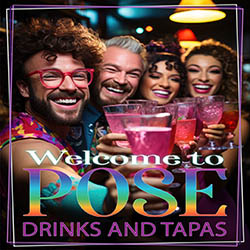Cozumel Hosts World Tourism Trends Summit 2024

Cozumel Hosts World Tourism Trends Summit 2024
Cozumel Hosts World Tourism Trends Summit 2024
Text & Translation by Moises JH & Tono Lopez
Cozumel hosted the World Tourism Trends Summit (WTTS) 2024, an event held on November 27 and 28. Leaders and experts in tourism, technology and sustainability met on the island of Cozumel, a prime destination for cruise tourism, cozumel4you was present.
At the WTTS, the trends that are shaping the future of the industry were presented. This congress brought together local and international businessmen and authorities, providing a space for the exchange of ideas on how digitalization and sustainability are influencing global tourism.
The inauguration of the event was chaired by the governor of Quintana Roo, Mara Lezama Espinosa, who highlighted the importance of tourism for the economy of the state and the country. In her speech, she mentioned that tourism represents a significant part of the Gross Domestic Product (GDP) and is responsible for generating a considerable percentage of jobs, especially for women, young people and older adults. This industry is considered key to the economic growth of the region, and the governor emphasized that the event in Cozumel is an opportunity to continue consolidating the state as a leader in the tourism sector.
Margarita Carbajal, president of the Federation of Tourism Entrepreneurs (Fetur), explained how this congress aims to explore the use of technology and artificial intelligence in the tourism industry. According to Carbajal, technological advances will allow tourist destinations and companies in the sector to improve the experience of travelers, optimizing both the services offered and operational efficiency. Digitalization and sustainability were the pillars of her message, highlighting that modern tourism needs to be aligned with the needs of tourists and the demands of the environment.
Along these lines, Nathalie Veronique Desplas Puel, representative of the federal Ministry of Tourism, highlighted the importance of advancing the professionalization of digital security. Technology not only improves the experience of tourists, but also presents challenges in terms of data protection and cybersecurity. Her intervention underlined the need to adopt stricter measures to protect information and ensure the safety of both tourists and companies in the sector.
One of the most discussed topics during the event was the use of artificial intelligence in tourism. Itzul Girón, CEO of Celestial Dynamics, presented MATRIA AI, a technological tool developed in Mexico, which uses digital twins to personalize the tourist experience. This innovation allows tourist destinations to anticipate the needs of travelers, adapting services to their individual preferences, which significantly improves resource management and the overall visitor experience. Girón explained how her company has created digital models that replicate behaviors and consumption patterns, allowing destinations and companies in the sector to be more proactive when offering personalized solutions.
Marcela Mexía Vázquez, a pioneer of digital transformation in Mexican tourism, also shared her perspective on artificial intelligence and how it is reshaping the sector. Mexía has worked on various projects that seek to integrate AI into tourism processes, improving everything from reservation management to customer service. Through his work, he has shown how digital tools can help tourist destinations become more efficient, reduce costs and, at the same time, offer more satisfactory experiences to tourists.
In the hotel sector, Josué Gio, founder of GuruHotel, shared his experience in the development of a technological platform designed to support small hotels in their digitalization process. Through GuruHotel, hoteliers can manage reservations, optimize their operations and improve the guest experience efficiently, without the need for large investments in technology. Gio highlighted the importance of providing accessible solutions for small and medium-sized businesses in the sector, who represent a significant part of the tourism offering in Latin America.
Cybersecurity was also on the agenda of the congress. Melissa Bugarini, a cybersecurity specialist, stressed that, just as a firefighter must be prepared to face a fire, tourism companies must have a response plan for possible cyber incidents. Online threats are increasingly common and sophisticated, so it is essential that companies in the sector are prepared to protect their systems and tourists’ data. The development of contingency plans and ongoing staff training are key measures to mitigate the risks associated with cyberattacks.
 Another relevant topic was innovation in digital payments. Alexis Andrade Cárdenas, an expert at Clip, spoke about how digital payment platforms are facilitating transactions in the tourism sector. Through solutions such as Clip, businesses can offer a more agile and accessible payment system for tourists, which improves the customer experience and optimizes operations. Andrade highlighted that the integration of digital payment solutions is essential for the growth of the industry, especially for small and medium-sized businesses seeking to adapt to new market demands.
Another relevant topic was innovation in digital payments. Alexis Andrade Cárdenas, an expert at Clip, spoke about how digital payment platforms are facilitating transactions in the tourism sector. Through solutions such as Clip, businesses can offer a more agile and accessible payment system for tourists, which improves the customer experience and optimizes operations. Andrade highlighted that the integration of digital payment solutions is essential for the growth of the industry, especially for small and medium-sized businesses seeking to adapt to new market demands.
Regarding content creation, Daniel Galo Medina, CEO of Familia Latina, presented his approach to storytelling as a tool to emotionally connect with tourists. Medina explained how stories can generate a positive impact, not only in the promotion of destinations, but also in the visibility of local communities and their cultures. Through its platform, Familia Latina has managed to give voice to diverse Latin stories, celebrating diversity and helping tourists create deeper ties with the destinations they visit.
Glenda Michel, Latam Partner Manager at Meta, spoke about the importance of a well-defined content strategy for tourism companies. According to Michel, creating valuable and relevant content not only positions companies as leaders in their sector, but also generates trust among consumers, which in the long term favors sales. Along the same lines, Sandra Román Delgado, Public Policy Manager at Meta, highlighted the role of WhatsApp as a direct communication channel with customers. This service has allowed companies to offer personalized attention in real time, resulting in a more fluid experience for tourists.
Pablo Sierra, creator of PABLOS IA, concluded the event with a presentation on how artificial intelligence is revolutionizing content creation in the tourism industry. Sierra highlighted that AI-based technological solutions allow for personalizing the user experience, improving the effectiveness of marketing campaigns and facilitating interaction with customers.
Finally, Bernardo Castañeda, leader of Alliances and Channels at Stripe for Latin America, explained how innovation in digital channels is transforming the operations of tourism companies. With increasing digitalization, companies must quickly adapt to new technologies to remain competitive in an increasingly disruptive market. Castañeda presented various digital solutions that help optimize operational processes, improve customer relations and increase the efficiency of tourism businesses.
In summary, WTTS Cozumel 2024 allowed participants to discuss the challenges and opportunities presented by digitalization in tourism. Cozumel, known for its relevance in cruise tourism, remains an important location for the sector, providing a space to address current and future trends that impact the industry.
The event had a very positive response, and although there are several opportunities for improvement, it represented a great showcase of information that left attendees with a great experience of approaching new ways of understanding tourism and how technology can be a great ally in the growth of their projects in one or more areas of their business.
World Tourism Trends Summit (WTTS) 2024 Cozumel
Text & Translation by Moises JH & Tono Lopez
Cozumel fue sede del World Tourism Trends Summit (WTTS) 2024, un evento que se celebró los días 27 y 28 de noviembre. Líderes y expertos en turismo, tecnología y sostenibilidad se reunieron en la isla de Cozumel, un destino primordial para el turismo de cruceros, cozumel4you estuvo presente.
En el WTTS se expusieron las tendencias que están dando forma al futuro de la industria. Este congreso reunió a empresarios y autoridades tanto locales como internacionales, brindando un espacio para el intercambio de ideas sobre cómo la digitalización y la sostenibilidad están influenciando el turismo global.
La inauguración del evento fue presidida por la gobernadora de Quintana Roo, Mara Lezama Espinosa, quien destacó la importancia del turismo para la economía del estado y del país. En su intervención, mencionó que el turismo representa una parte significativa del Producto Interno Bruto (PIB) y que es responsable de generar un porcentaje considerable de empleos, especialmente para mujeres, jóvenes y adultos mayores. Esta industria es considerada clave para el crecimiento económico de la región, y la gobernadora hizo hincapié en que el evento en Cozumel es una oportunidad para seguir consolidando al estado como un líder en el sector turístico.
Margarita Carbajal, presidenta de la Federación de Empresarios Turísticos (Fetur), explicó cómo este congreso tiene como objetivo explorar el uso de la tecnología y la inteligencia artificial en la industria turística. Según Carbajal, los avances tecnológicos permitirán a los destinos turísticos y a las empresas del sector mejorar la experiencia de los viajeros, optimizando tanto los servicios ofrecidos como la eficiencia operativa. La digitalización y la sostenibilidad fueron los pilares de su mensaje, resaltando que el turismo moderno necesita estar alineado con las necesidades de los turistas y las exigencias del medio ambiente.
En esta línea, Nathalie Veronique Desplas Puel, representante de la Secretaría de Turismo federal, destacó la importancia de avanzar en la profesionalización de la seguridad digital. La tecnología no solo mejora la experiencia de los turistas, sino que también presenta desafíos en términos de protección de datos y ciberseguridad. Su intervención subrayó la necesidad de adoptar medidas más estrictas para proteger la información y garantizar la seguridad tanto de los turistas como de las empresas del sector.
Uno de los temas más tratados durante el evento fue el uso de la inteligencia artificial en el turismo. Itzul Girón, CEO de Celestial Dynamics, presentó MATRIA AI, una herramienta tecnológica desarrollada en México, que utiliza gemelos digitales para personalizar la experiencia del turista. Esta innovación permite a los destinos turísticos anticipar las necesidades de los viajeros, adaptando los servicios a sus preferencias individuales, lo que mejora significativamente la gestión de los recursos y la experiencia general del visitante. Girón explicó cómo su empresa ha creado modelos digitales que replican comportamientos y patrones de consumo, lo que permite a los destinos y las empresas del sector ser más proactivos a la hora de ofrecer soluciones personalizadas.
Marcela Mexía Vázquez, pionera de la transformación digital en el turismo mexicano, también compartió su perspectiva sobre la inteligencia artificial y cómo está remodelando el sector. Mexía ha trabajado en diversos proyectos que buscan integrar la IA en los procesos turísticos, mejorando desde la gestión de las reservas hasta la atención al cliente. A través de su trabajo, ha demostrado cómo las herramientas digitales pueden ayudar a los destinos turísticos a ser más eficientes, reducir costos y, al mismo tiempo, ofrecer experiencias más satisfactorias a los turistas.
En el ámbito hotelero, Josué Gio, fundador de GuruHotel, compartió su experiencia en el desarrollo de una plataforma tecnológica diseñada para apoyar a los pequeños hoteles en su proceso de digitalización. A través de GuruHotel, los hoteleros pueden gestionar reservas, optimizar sus operaciones y mejorar la experiencia del huésped de manera eficiente, sin la necesidad de grandes inversiones en tecnología. Gio destacó la importancia de brindar soluciones accesibles para los pequeños y medianos empresarios del sector, quienes representan una parte significativa de la oferta turística en Latinoamérica.
diseñada para apoyar a los pequeños hoteles en su proceso de digitalización. A través de GuruHotel, los hoteleros pueden gestionar reservas, optimizar sus operaciones y mejorar la experiencia del huésped de manera eficiente, sin la necesidad de grandes inversiones en tecnología. Gio destacó la importancia de brindar soluciones accesibles para los pequeños y medianos empresarios del sector, quienes representan una parte significativa de la oferta turística en Latinoamérica.
La ciberseguridad también estuvo en la agenda del congreso. Melissa Bugarini, especialista en ciberseguridad, resaltó que, al igual que un bombero debe estar preparado para enfrentar un incendio, las empresas turísticas deben contar con un plan de respuesta ante posibles incidentes cibernéticos. Las amenazas en línea son cada vez más comunes y sofisticadas, por lo que es esencial que las empresas del sector estén preparadas para proteger sus sistemas y los datos de los turistas. El desarrollo de planes de contingencia y la formación continua del personal son medidas claves para mitigar los riesgos asociados con los ataques cibernéticos.
Otro tema relevante fue la innovación en los pagos digitales. Alexis Andrade Cárdenas, experto de Clip, habló sobre cómo las plataformas de pago digital están facilitando las transacciones en el sector turístico. A través de soluciones como Clip, los negocios pueden ofrecer un sistema de pago más ágil y accesible para los turistas, lo que mejora la experiencia del cliente y optimiza las operaciones. Andrade destacó que la integración de soluciones digitales de pago es fundamental para el crecimiento de la industria, especialmente para los negocios pequeños y medianos que buscan adaptarse a las nuevas demandas del mercado.
En cuanto a la creación de contenido, Daniel Galo Medina, CEO de Familia Latina, presentó su enfoque sobre el storytelling como herramienta para conectar emocionalmente con los turistas. Medina explicó cómo las historias pueden generar un impacto positivo, no solo en la promoción de destinos, sino también en la visibilidad de las comunidades locales y sus culturas. A través de su plataforma, Familia Latina ha logrado dar voz a diversas historias latinas, celebrando la diversidad y ayudando a los turistas a crear vínculos más profundos con los destinos que visitan.
Glenda Michel, Latam Partner Manager de Meta, habló sobre la importancia de una estrategia de contenido bien definida para las empresas turísticas. Según Michel, crear contenido valioso y relevante no solo posiciona a las empresas como líderes en su sector, sino que también genera confianza entre los consumidores, lo que a largo plazo favorece las ventas. En la misma línea, Sandra Román Delgado, Gerente de Políticas Públicas Meta, destacó el rol de WhatsApp como canal de comunicación directa con los clientes. Este servicio ha permitido a las empresas ofrecer atención personalizada en tiempo real, lo que resulta en una experiencia más fluida para los turistas.
Finalmente, Bernardo Castañeda, líder de Alianzas y Canales de Stripe para Latinoamérica, explicó cómo la innovación en canales digitales está transformando las operaciones de las empresas turísticas. Con la creciente digitalización, las empresas deben adaptarse rápidamente a las nuevas tecnologías para mantenerse competitivas en un mercado cada vez más disruptivo. Castañeda presentó diversas soluciones digitales que ayudan a optimizar los procesos operativos, mejorar la relación con los clientes y aumentar la eficiencia de los negocios turísticos.
Pablo Sierra, creador de PABLOS IA, concluyó el evento con una presentación sobre cómo la inteligencia artificial está revolucionando la creación de contenido en la industria turística. Sierra destacó que las soluciones tecnológicas basadas en IA permiten personalizar la experiencia del usuario, mejorando la efectividad de las campañas de marketing y facilitando la interacción con los clientes.
En resumen, el WTTS Cozumel 2024 permitió a los participantes discutir los desafíos y oportunidades que presenta la digitalización en el turismo. Cozumel, conocido por su relevancia en el turismo de cruceros, sigue siendo un lugar importante para el sector, proporcionando un espacio para abordar las tendencias actuales y futuras que impactan a la industria.
El evento tuxo una respuesta muy positiva, y si bien tiene varias oportunidades de mejora, representó un gran escaparate de información que dejó en los asistentes una gran experiencia de acercamiento a nuevas formas de comprender el turismo y como la tecnologia puede ser una gran aliada en el crecimiento de sus proyectos en alguna o varias áreas de sus negocios.
Antonio Lopez .Bachelor of Communication Sciences and Techniques with 13 years of experience in the media.
- Cozumel Current News - April 4, 2025
- Three Cozumel topics that may be of interest - March 21, 2025
- Bill Salmon Cozumel Fire Station - March 14, 2025
Moses Jimenez. Content creator for more than 20 years, 18 of them on the island of Cozumel. Collaborator in multiple informative projects and social diffusion. Antonio Lopez . Bachelor of Communication Sciences and Techniques with 13 years of experience in the media.
Three Cozumel topics that may be of interest
Three Cozumel topics that may be of interest Three Cozumel topics...
Cozumel Carnaval 2025 Ends
Cozumel Carnaval 2025 Ends Cozumel Carnaval 2025 Ends With the Tradition...
Cozumel Carnaval 2025
Cozumel Carnaval 2025 Cozumel Carnival 2025: Tradition, Celebration and Joy for All...
Direct Flights Tulum Costa Rica
Direct Flights Tulum Costa Rica Direct Flights Tulum to Costa Rica to...





















Leave a comment